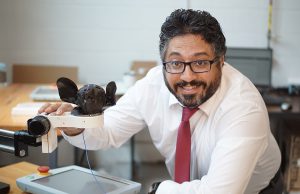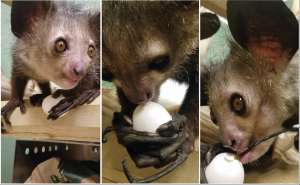The Duke Lemur Center located in Durham, NC, opened its doors to Niri and his research. Niri began to seek funding to visit the Duke Lemur Center and meet an aye-aye face-to-face.
“I found myself in my department head’s office asking for his support to visit DLC and explaining why I had to visit the center,” Niri said. “The impact of right decisions made by the leadership is so important in the success of junior faculty members. During the course of my academic career at NMSU, Dr. David Jauregui, the department head, never said no to me when I asked for justified resources to promote research, education, and outreach in our department, college, and university.”
Niri visited the Duke Lemur Center and over the course of two years, he collaborated with biologists, zoologists and other engineers with non-destructive testing experience.
“I started reading, reading and more reading about biological aspects and making connections to engineering aspects,” Niri said. “In about six months I had the first draft of the proposal ready.”
Niri explained there are three opportunities within the scope of five years for a junior faculty member to submit CAREER proposals. He had the opportunity to submit a pre-proposal as a regular research proposal to the NSF.
“Four months before the submission deadline, I got positive feedback from an NSF panel about my regular research proposal,” Niri said. “There were some issues they wanted me to address.”
Niri kept reaching out to colleagues for feedback and polished the proposal. In December of last year, he began receiving emails about his CAREER proposal submission. Shortly after Niri attended a meeting with the NSF program director and other faculty members from universities across the country. The official announcement about Niri receiving the award was made in April.
“The award is a wonderful example of the feat possible when the department, college, and university work together in providing the necessary resources to support the vision, drive, and hard work of our NMSU faculty members,” Dr. Jauregui said. “I congratulate Dr. Niri and look forward to the amazing discoveries he will make with his research group and the practical impact it will have on the civil, mechanical, and aerospace engineering fields.”
Aside from his endless research and creativity, Niri credits the leadership in the College of Engineering, Department of Civil Engineering, Aggie Innovation Space, his academic mentors, and family, as well as graduate researchers under his supervision for this accomplishment.
“As a junior faculty member, I didn’t think I would have received the amount of support I did,” Niri said. “It’s an important lesson here for academic leaders: be open-minded, listen, support, and foster junior faculty members who are excited about their fields and have ideas to shape the future.”
Civil engineering assistant professor receives prestigious NSF CAREER award


Researching an unusual primate from Madagascar landed Ehsan Dehghan-Niri, assistant professor in the Department of Civil Engineering at New Mexico State University, the 2021 National Science Foundation Faculty Early Career Development award.
The $579,236 CAREER award will be distributed over the course of five years for Niri’s project titled, “Understanding the Exceptional Near-Field Auditory System of the Aye-Aye, One of the Most Unusual Primates in the World.”
“It’s an honor that stays with you your entire career,” Niri said. “It’s one of the most prestigious funding awards faculty members can receive in the United States. [The committee] recognizes that your research is going to be very important and have a significant scientific impact in that particular field in the future.”
According to the NSF website, The Faculty Early Career Development Program is a “foundation-wide activity that offers the National Science Foundation’s most prestigious awards in support of early-career faculty who have the potential to serve as academic role models in research and education and to lead advances in the mission of their department or organization.”
The activities pursued by early-career faculty should build a solid foundation for a lifetime of leadership in integrating education and research, according to the NSF.
“Dr. Niri’s passion and enthusiasm to advance the field of non-destructive testing and evaluation are inspiring to all who work with him,” Dr. Jauregui said. “Through his prestigious award from NSF, he has increased the visibility of NMSU throughout the country.”
Niri is studying the aye-aye lemur, a small primate with elongated fingers and phenomenal hearing capabilities. The aye-aye uses these morphological features along with its remarkable near-field acoustic-based sensing to find food and survive in the Madagascan rain forests.
Niri’s research aims to closely study these morphological features to improve and revolutionize non-destructive testing methods. Non-destructive testing and non-destructive evaluation methods are used to test critical components in airplanes, pipelines, railroads, bridges and building structures. Non-destructive evaluation methods are also applied in medical settings like ultrasounds, for example.
Niri began research on the aye-aye shortly after watching a documentary about them in 2018.
“From a researcher’s point of view, I thought, ‘wow, this animal can do tap-scanning?’ and I started asking more questions,” Niri said. “After I read an interesting article about the aye-ayes written by a biologist, Dr. Erin Ehmke, at the Duke Lemur Center, I immediately called her.”
